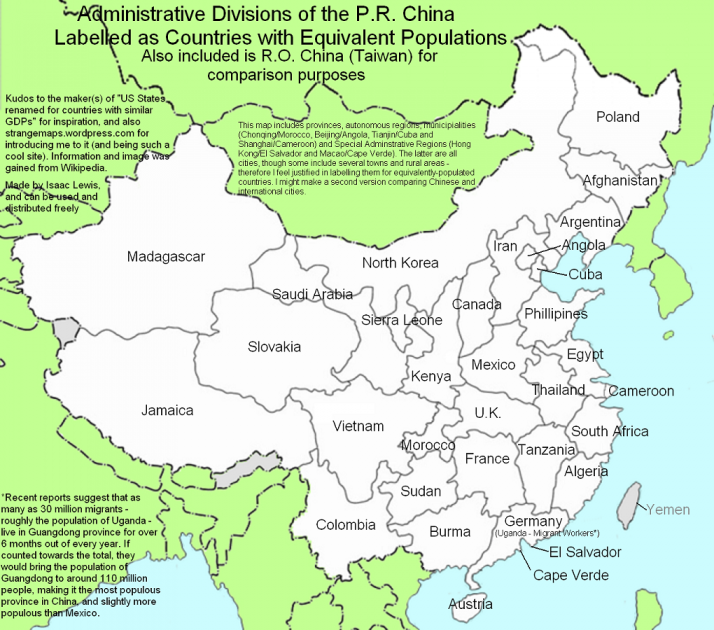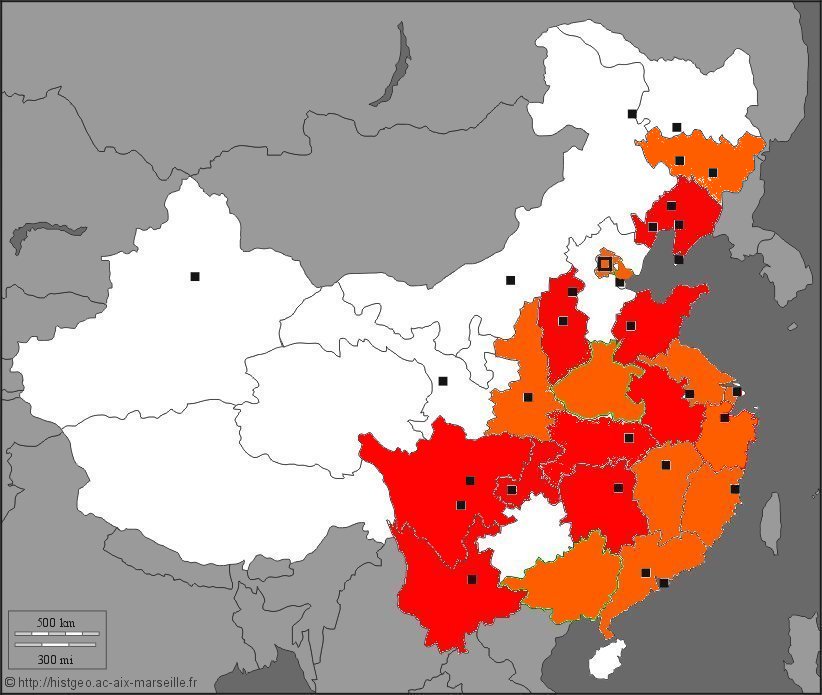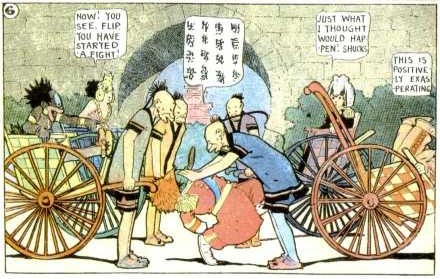Reading David Bandurski’s ever keen observations over at China Media Project in “As China shout its line on Tibet, is anybody listening?”, I got struck by deja vu all over again. Three times.
First, there’s the endless drumbeat of the official line in Chinese media Bandurski illustrates thusly:
In People’s Daily: “Treasuring the fruits of democratic reform: celebrating the 50th anniversary of the liberation of millions of Tibetan serfs”
In Guangming Daily: “Treasuring the fruits of democratic reform: celebrating the 50th anniversary of the liberation of millions of Tibetan serfs”
In Economic Daily: “Treasuring the fruits of democratic reform: celebrating the 50th anniversary of the liberation of millions of Tibetan serfs”
At Xinhua, etc. etc. etc.
And so on. Which, of course, is echoed repeatedly in English as Tibet to set “Serf Liberation Day”, or minor variations thereof. You can even read about it in Esperanto, along with full coverage of the two conferences last month. Which reminds me of my all time favorite bit of heavy handedness from Chinese English media, the special report page Xinhua produced titled “Condemn Falun Gong”, in which the headlines report all sorts of groups doing just that: a forum, overseas Chinese, the students of Chongqing, “people of all circles”, and then, so as not to leave out people without circles, simply “people” condemn it, in case you weren’t sure if you were invited to join in the festivities.
Bandurski then reminded me of the news that China is investing 45 billion RMB in CCTV, Xinhua and People’s Daily to “accelerate “going out”” and go global with its news operations to set media agendas. The maximum any one of them can get is 15 billion, which is alot more than CCTV-9 has ever seen, but wait a minute. I’ve heard most of this before. Li Changchun has been saying more or less the same things about “going out” since 2003, albeit I’m guessing he’s not referring to the Three Represents as often. The same goes for soft power – just because America finally has a president who likes Joseph Nye doesn’t mean the Chinese just discovered him too. It’s been a perennial favorite for years, and been applied to everything from CNN to Korean soap operas, and always boils down to “China doesn’t have enough”.
First of all, one bit going around is that China is inspired to start its own Al Jazeera. That was something heard in 2004 and repeatedly thereafter from Li Xiguang, Tsinghua professor and at that time newly appointed director of CCTV International. Li was behind the relatively tame revamp of CCTV-9 at the time, when they hired Edwin Maher, and launched Spanish and French language channels (and five years later, how many people watch those?).* Now, CCTV is on the verge of launching Russian and Arabic channels, and plans to have seven different languages on 11 channels by 2012. I count six including Mandarin. Is there a Cantonese CCTV, or are they going to launch the world’s first global 24 hour esperanto network? Point being, that 15 billion RMB gets sliced 11 ways. Most importantly, what kind of strategy is this? Al Jazeera made its mark primarily through exclusive journalism in one language – it’s own – and then expanded into English. At this rate, the Big Underpants building in Beijing is going to be the Tower of Babel, or worse resemble the EU’s translation center.
Besides this lack of focus, there are other reasons China can’t have an Al Jazeera:
- Size matters: Al Jazeera is based in Qatar, which is about 11,000 square kilometers (4,400 square miles). To put this in perspective, all of Beijing is 16,807 kilometers. But their primary Arabic business covers the entire Arab world. Al Jazeera offices have been closed or raided because of negative reporting in the Palestinian territories, Egypt, Saudi Arabia, Tunisia, Kuwait, Jordan and Bahrain. It’s not beholden to the governments of 99% of its regional viewers. That’s one of the reasons Al Jazeera was so successful.
- Nobody wants to hear about Qatar: Qatar has about 350,000 citizens according to Wikipedia, and around another 700,000+ expats. There is news to be reported, and Al Jazeera has been criticized for not looking in its own backyard too closely, but the country is just too small to be a generator of globally significant events (except about Al Jazeera itself). By contrast, China sneezes about the dollar and markets turn.
- Al Jazeera’s main mission is not boosterism: China is flatly stating they want a Chinese network to boost their reputation. The Emir of Qatar, by contrast, has allowed editorial independence and Qatar doesn’t really need it anyway thanks to size and oil. Not to mention perhaps the Emir understands that it doesn’t work. Soft power does not seem the Emir’s main interest, at least not in the way Chinese officials and scholars tend to think of it.
- They made their bones with regional Johnny-on-the-spots and call-in shows: Al Jazeera’s primary success was in Arabic, not English, with bureaus reporting live on the scene, even if it is only horrifying images of bodies (not typical fare for Chinese media). How often has Chinese language television been breaking news for their domestic audience with investigative interviews or live reports? Not so much. Al Jazeera’s popular live call-in shows, meanwhile, have often involved shouting matchs and free debate.
Finally, Bandurski also points out that China shipped a happy Tibetan monk all the way to Canada to say how not mad he is about anything. Well, three years ago China was building the largest embassy in the U.S., designed by I.M. Pei, and their ambassador had started gladhanding people in diners in Iowa. That didn’t pay off huge either.
China may have a respectable global news franchise yet, but throwing money around and talking about copying models that don’t fit isn’t going to make one.
*Li Xiguang’s speech on World Press Freedom Day in 2004 about coverage of the Iraq War by Chinese jounalists is fascinating. He basically savages CNN and Fox for spewing U.S. propaganda, but also savages the Chinese government for essentially “turning over” state TV to Rupert Murdoch.
UPDATE: SARFT said today that CCTV International’s four existing stations now reach 100 million households. I’ll just point out two things: first, reach is not the same as viewers or trust, and second, if that’s the case it wouldn’t make much sense to spend the 45 billion on a new network, but rather in integrating Xinhua’s overseas bureaus with CCTV International. Will turf wars and red tape make this difficult? Who knows.




